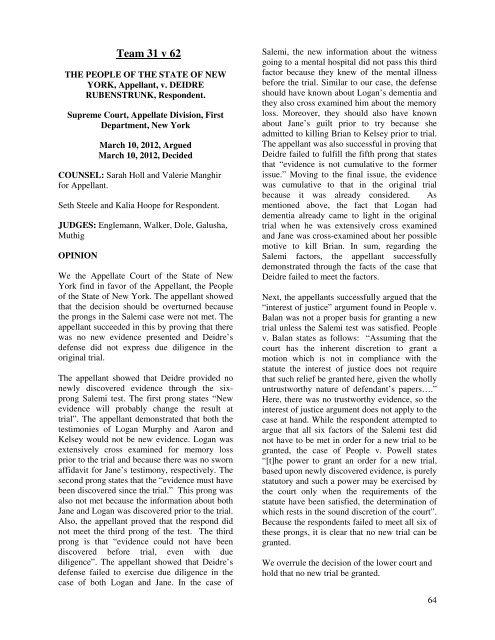2012 Conference Executive Record Report.pdf - YMCA of Greater ...
2012 Conference Executive Record Report.pdf - YMCA of Greater ...
2012 Conference Executive Record Report.pdf - YMCA of Greater ...
You also want an ePaper? Increase the reach of your titles
YUMPU automatically turns print PDFs into web optimized ePapers that Google loves.
Team 31 v 62<br />
THE PEOPLE OF THE STATE OF NEW<br />
YORK, Appellant, v. DEIDRE<br />
RUBENSTRUNK, Respondent.<br />
Supreme Court, Appellate Division, First<br />
Department, New York<br />
March 10, <strong>2012</strong>, Argued<br />
March 10, <strong>2012</strong>, Decided<br />
COUNSEL: Sarah Holl and Valerie Manghir<br />
for Appellant.<br />
Seth Steele and Kalia Hoope for Respondent.<br />
JUDGES: Englemann, Walker, Dole, Galusha,<br />
Muthig<br />
OPINION<br />
We the Appellate Court <strong>of</strong> the State <strong>of</strong> New<br />
York find in favor <strong>of</strong> the Appellant, the People<br />
<strong>of</strong> the State <strong>of</strong> New York. The appellant showed<br />
that the decision should be overturned because<br />
the prongs in the Salemi case were not met. The<br />
appellant succeeded in this by proving that there<br />
was no new evidence presented and Deidre’s<br />
defense did not express due diligence in the<br />
original trial.<br />
The appellant showed that Deidre provided no<br />
newly discovered evidence through the sixprong<br />
Salemi test. The first prong states “New<br />
evidence will probably change the result at<br />
trial”. The appellant demonstrated that both the<br />
testimonies <strong>of</strong> Logan Murphy and Aaron and<br />
Kelsey would not be new evidence. Logan was<br />
extensively cross examined for memory loss<br />
prior to the trial and because there was no sworn<br />
affidavit for Jane’s testimony, respectively. The<br />
second prong states that the “evidence must have<br />
been discovered since the trial.” This prong was<br />
also not met because the information about both<br />
Jane and Logan was discovered prior to the trial.<br />
Also, the appellant proved that the respond did<br />
not meet the third prong <strong>of</strong> the test. The third<br />
prong is that “evidence could not have been<br />
discovered before trial, even with due<br />
diligence”. The appellant showed that Deidre’s<br />
defense failed to exercise due diligence in the<br />
case <strong>of</strong> both Logan and Jane. In the case <strong>of</strong><br />
Salemi, the new information about the witness<br />
going to a mental hospital did not pass this third<br />
factor because they knew <strong>of</strong> the mental illness<br />
before the trial. Similar to our case, the defense<br />
should have known about Logan’s dementia and<br />
they also cross examined him about the memory<br />
loss. Moreover, they should also have known<br />
about Jane’s guilt prior to try because she<br />
admitted to killing Brian to Kelsey prior to trial.<br />
The appellant was also successful in proving that<br />
Deidre failed to fulfill the fifth prong that states<br />
that “evidence is not cumulative to the former<br />
issue.” Moving to the final issue, the evidence<br />
was cumulative to that in the original trial<br />
because it was already considered. As<br />
mentioned above, the fact that Logan had<br />
dementia already came to light in the original<br />
trial when he was extensively cross examined<br />
and Jane was cross-examined about her possible<br />
motive to kill Brian. In sum, regarding the<br />
Salemi factors, the appellant successfully<br />
demonstrated through the facts <strong>of</strong> the case that<br />
Deidre failed to meet the factors.<br />
Next, the appellants successfully argued that the<br />
“interest <strong>of</strong> justice” argument found in People v.<br />
Balan was not a proper basis for granting a new<br />
trial unless the Salemi test was satisfied. People<br />
v. Balan states as follows: “Assuming that the<br />
court has the inherent discretion to grant a<br />
motion which is not in compliance with the<br />
statute the interest <strong>of</strong> justice does not require<br />
that such relief be granted here, given the wholly<br />
untrustworthy nature <strong>of</strong> defendant’s papers….”<br />
Here, there was no trustworthy evidence, so the<br />
interest <strong>of</strong> justice argument does not apply to the<br />
case at hand. While the respondent attempted to<br />
argue that all six factors <strong>of</strong> the Salemi test did<br />
not have to be met in order for a new trial to be<br />
granted, the case <strong>of</strong> People v. Powell states<br />
“[t]he power to grant an order for a new trial,<br />
based upon newly discovered evidence, is purely<br />
statutory and such a power may be exercised by<br />
the court only when the requirements <strong>of</strong> the<br />
statute have been satisfied, the determination <strong>of</strong><br />
which rests in the sound discretion <strong>of</strong> the court”.<br />
Because the respondents failed to meet all six <strong>of</strong><br />
these prongs, it is clear that no new trial can be<br />
granted.<br />
We overrule the decision <strong>of</strong> the lower court and<br />
hold that no new trial be granted.<br />
64
















